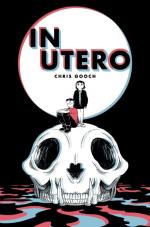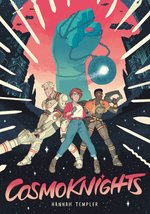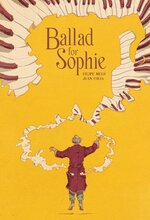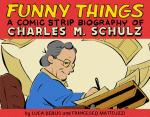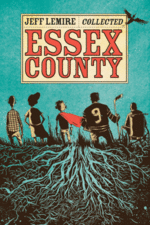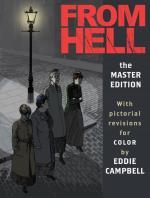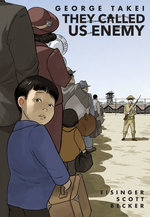Behold: the lost Top Shelf interview!
May 7, 2009

[MORE]
YEAR BY YEAR
An Interview with Chris Staros and Brett Warnock,
Top Shelf Productions
November 2007
By Quinn Johnson
YEAR BY YEAR chronicles the careers of the comics industry’s independent publishers from their early beginnings to the present.
Quinn Johnson: Chris and Brett, thanks for your time. Tell me a little about what you were doing before you joined forces to create Top Shelf?
Brett Warnock: I started publishing pretty much a few years out of college and I had just discovered independent comics -- Hate, Eightball, Drawn and Quarterly, stuff like that -- and then mini-comics, which was mostly mail-order; this was pre-internet, or at least internet was very, very young at the time, and so most of the mini-comics trade was just through the mail. I got pretty active in that, and I was kind of an aspiring cartoonist myself, and so I was drawing some comics in my free time. I actually submitted some to Drawn and Quarterly; of course I never heard back because they were pretty terrible. But I made a mini-comic (this is like in ‘94, early probably) and I had so much more fun producing the actual mini-comic than drawing the comics themselves; a little light bulb went off in my head and I thought, “I think maybe this is what I’m more suited to do.” I started publishing a few people, Wayne Shellabarger, who we’re going to help have a book come out with next year; Ulana Zahajkewycz, one of the first people that I helped publish -- she was the artist of our 10th anniversary poster; and I started out on the anthology called Top Shelf. When I launched my company in ’95 it was called Primal Groove Press, which doesn’t exactly roll off the tongue, so a couple years later, in early ’97 before Chris and I hooked up, I changed the name officially to Top Shelf. [Later I] met Chris on the scene and we hooked up and the rest is history.
Chris Staros: In the early days I didn’t even read comics. I was always a musician and I just stumbled into comics around almost 30 years old; I’m unusual unlike a lot of people like Brett, you know, that get into comics young. I just fell into the indie stuff right away. V for Vendetta was the book that got me into comics. I discovered all the Fantagraphics stuff, the Drawn and Quarterly stuff, all the underground stuff from the ‘70s and ‘80s and really got into them; and I just thought that I would get involved somehow and had that blinding flash that went off at the obvious to make a ‘zine.
B: Yeah, they were huge back in the day, printed ‘zines.
C: Yeah, nobody was blogging, nobody had their own websites, but ‘zines were big. So I started a ‘zine called the Staros Report, which was my take on what the most intelligent and innovative comics were out in the industry. I had started reading a lot of comics, I mean a LOT of comics, like THOUSANDS of comics, trying to get caught up on something that I hadn’t been out on. I caught the bug really bad. I starting taking notes because I have a bad memory and I realized that’s why there’s no super useful [comics reference]. So I created a ‘zine called Staros Report to kind of get the word out, because you know a lot of comic book shops that you go into don’t have any of the indie stuff in there, and that really distressed me. You know, back then … mailing people checks in envelopes or cash in envelopes to get stuff [was] the only way to find it if your store didn’t have it, so the guide was to tell you not only what’s good but where the good stuff was. That led me to get some relationships with people like Eddie Campbell; I did an interview with him, we got to be friends, and then he went and started self-publishing. I started handling his business for him over in the states as his agent since he was in Australia. And so I started attending conventions to sell my ‘zines and Eddie’s books and then I picked up a couple more clients like Gary Spencer Millidge out of England. Pretty soon I was running a mock-publishing operation but basically with other people’s money.
B: Yeah, you were more like a facilitator.
C: Exactly, yeah. But more on the ins and outs of the business on a small scale with Eddie’s stuff and Gary’s stuff and then with my ‘zines which were also picked up and finally solicited. And then Brett and I met on the circuit back then (like ’94, ’95, ’96), as we were both getting out there and hawking our wares. Brett introduced himself to me by sending me a letter with some of his books so that maybe I would review them in the Staros Report and I really dug his stuff; it was just gorgeous, his sense of design was amazing, and his letter was very cool because he talked about loving good comics regardless of the label and that was exactly my philosophy. I wasn’t an arrogant indie guy, I just liked to read comics. A couple years later, at the SPX (Small Press Expo) ’97, we decided to hook up.
Q: If you don’t mind a side question, I think a lot of people love comics but they don’t really know how to make that leap from being a fan to actually being a creator or a producer or a publisher or an agent like you guys were becoming. What were some of the steps you had to take to get to that point?
C: Well, (laughs) you go through a lot of stupidity for one thing.
B: Now, with the internet and blogs, you have people like Tom Spurgeon [The Comics Reporter] -- he’s got just a plethora of links and stuff -- and there are tons of tools at your fingertips now. We didn’t have any of that, we were grasping at straws in the dark and trying to figure out how to go from there.
C: There’s a million reasons in the world to not do anything and it really does take a lot of effort to get off the ground and actually put something out there. I think a lot of people want to do certain things but there’s just that “do-it-yourself” spark that you’ve gotta have. So like with all cartoonists, once they cross that line and decide they’re going to make a mini-comic, they’re going to manufacture it, they’re going to put it out, and they’re going to attend some conventions to start selling them – that’s when you cross that line and you start really becoming part of the industry. That’s what Brett did with his mini’s and his anthologies, that’s what I did with my ‘zines. Trust me, our starts were extremely humble. My first ‘zine is such an embarrassment I wouldn’t show it to anybody. Thank God there’s only forty copies. They’re still only worth a dollar if that tells you how uncollectible they are. But getting that first thing out there -- putting something behind you, integrating all the lessons from experience, moving on and doing something better. If it wasn’t for that first ‘zine, we would have never gotten to publish Blankets or From Hell or Lost Girls or Owly years later because we wouldn’t have had all those lessons behind us to get there. Just taking that first step, the confidence to put something out there and the humility to know the next thing you do is going to be a lot better. That’s just what we’ve been doing.
Q: As far as getting the capital to start up some of these business ventures, was it just stuff that you had saved or did you have to find sponsors?
B: Well unfortunately I guess some good things come out of bad things. In February 2004 my mom died of cancer and my dad told us that we had some trust money available to us (my sister and myself); not a lot, $20,000 apiece. [I was] contemplating film school [or] a trip to the UK…and I was like, “You know what, I think I’m just going to go for the publishing.” I asked my dad for the $20,000, which at the time I thought would last me twenty years. I had no clue how expensive things were. But basically that’s how I got started.
C: In my case I didn’t start so grand with the $20,000 thing, I mean I just started doing the Staros Report on a very early budget. I think the very first year I did anything, I made like $100. And then the second year $500, and so forth. And then eventually we became a million dollar corporation, but that was, you know, years later. So a lot of it was learning the lessons with small amounts of money first and starting small.
B: That definitely is the key just to start. In today’s world you have so many more options than we did back then. Photocopying is so cheap if you want to start on the low end of the scale.
C: Yeah, print on demand is available for low runs.
B: And something that I’ve even started to chew on a little (and this is still a couple years down the road for Top Shelf, if it happens, but I think it’s inevitable at some point) is serializing things online – seeing what the demand is, and then if the demand is high for a particular thing, then go to print with that book. But for the time being, so many literally huge amounts of the people that we publish we’ve discovered at the conventions, at their little table. They might be sharing the table with somebody, and I’m like, “This stuff is really, really, really good,” and we’ll buy their mini-comics, and we’ll start a correspondence with them, and the next thing you know, they’ve evolved from the mini-comics ideal, and now they’re ready to produce long-form narratives. But if you’re going straight out of the gate self-publishing, again the model is very similar: start small, do as many conventions as you can, send out as many preview copies as you can, not just to the media but your peers, and you just jump in, get yourself wet, and mix it up with people in the industry. It’s not a real big mystery on that level.
C: But the answer to another part of your question is we were truly self-financed. Once we got together, whenever we needed money, you know, I plugged it in, whether from my personal savings, or we borrowed off our credit cards to do it…
B: We maxed out tons of credit cards. We both had day jobs for years, while we were launching the company; it’s only been like five years for me since I’ve been full-time.
C: Yeah, and about seven for me. Once we finally reached the corner where we needed for somebody to go full-time, I went first (since I was more the sales guy), and then Brett came on later full-time. We basically worked two jobs for three years, day job and evening job to get it off the ground, to get it growing to the point where it was actually bringing some money in and so forth. It was fun.
Q: Yeah, it sounds fun. That’s very encouraging -- there are a lot of people out there that just don’t know how to start but it sounds like it’s mostly just getting the courage to do something about it and learn as you go.
B: Yep, that’s it.
Q: You’re working with some really high profile, very talented people. How do you go about recruiting these various creators, or getting to the point where you’re representing them and publishing their work?
C: Well every publisher goes through sort of a maturation process. It’s all about your network and who you know and the respect that you get at an outfit -- what your reputation is behind the scenes, how easy you are to work with, how good of a job do you do, what is your editorial line like, and all those kinds of things. While Brett and I were starting to publish some people, we also made it a point to do as many conventions as we can, so we do twenty-one shows a year. We’re always meeting cartoonists, we’re always getting to know them, we’re able to court them and talk about projects, get to be friends with them, and decide whether we want to work together or not; and then keep books like Blankets and From Hell and Lost Girls and Owly and so forth and get people to go, “Man, I really want to work with you guys.” So projects will come to us, then also we will go to them, you know, and sometimes it takes a long time to build a reputation. I mean, here we are ten years down the road, celebrating our 10-year anniversary last month, and the people in the industry -- the business side of the house, the professional side of the house -- they know Top Shelf very well, but the fans in general and even some of the retailers still don’t know who we are after ten years of brand development, so it’s one of those—
B: Ongoing.
C: --ongoing processes of trying to build your network and your reputation.
B: Again, just get out there and mix it up. Literally that’s the only way you’re going to make the connections. You know, between Chris and I, we know a couple hundred of THE key retailers in the industry and it’s NOT from a letter-writing campaign, it’s from going to the shows, and meeting these guys. Going to their cities, visiting their stores, and it’s a lot of work, but it’s also a great deal of fun, getting to know these guys who’re out there on the front line. And really there’s not that many retailers in the industry that are huge supporters of the type of work that Top Shelf does, so it’s not an impossible task, but it does take a little bit of work.
Q: Along with the theme of YEAR BY YEAR, what were some of the immediate hurdles that you had to overcome that first year?
B: I think a lot of it was figuring out what we were going to publish, and like the sizes, the price points, and learning to deal with larger printers, because you know, through the first couple of years that I was publishing on my own it was primarily local printers, at a very small print run. It was only when Chris and I joined forces that we were kind of forced somewhat to jump into the fray and do larger print runs, and deal with distributors, and all this stuff, you know. So it’s just a learning process, and finding out all these processes, which is still an ongoing thing. That’s the key, you know. But I think in the early days our big thought was, “What are we going to publish? What are we going to do?” Because now, all eyes are on us, and people are going to be looking, “Hey, what are these guys doing?” so we had to make some decisions, and you know, it’s just one of those things.
Q: If you had to summarize the first five years or so of Top Shelf, about 1997 to 2001, what were some of the major successes or challenges that you had?
B: Our first big two was finding Craig Thompson and publishing Good-bye, Chunky Rice.
C: Right. At the very same month, becoming the distributor for From Hell (by Alan Moore and Eddie Campbell) and almost co-publishing it as we were handling all of the distribution and sales for Eddie Campbell Comics on that book. So we became identified with both Good-bye, Chunky Rice and From Hell at the same month, same year, I think it was around ’99?
B: Yeah, ’98, ’99. And so I think those were the two huge things.
C: Yeah, towards the end of ’99. So that’s what put us on the map as critical darlings and guys getting out there and doing the right thing and so forth.
Q: From Hell was the first Top Shelf book that I heard of— That’s a pretty huge success.
B: That success also leads to one of our greatest challenges, which was the distributor collapse. The money that was owed was predicated on the sales of From Hell, which was produced at the same time as the movie. When the movie came out, the problem was dealing with the distributor who was going bankrupt.
Q: And that was what you’ve called “Black Tuesday?”
B: “Black Tuesday and the Twelve Hour Miracle.”
Q: So according to your emails (**see below), in twenty-four hours basically you went from being bankrupt—
Chris: To fully back in business. Yeah, it was one of those days where the power of the internet was fully realized for an instant and also that the power of the comics community was shown to be what it was: a really tight-knit group of people that really care about the medium and understand the business and the nature of these things and were willing to support it. And you know, 2002 was also still kind of right before the time people were really comfortable putting their credit card numbers on the internet, and Amazon.com was probably the only place that people spent their money online -- and they did that very limitedly too. Nowadays everybody buys stuff online but back then they didn’t. It was a really cool day.
Q: So what were some of the major successes and challenges that you faced in the second five years, till about 2006, 2007?
C: Well, I think one of the difficult lessons you learn in any kind of development of a company, and especially in a publishing one that’s so capital-intensive as publishing, is that it’s very difficult to kick a company off, to get one started. But it’s even harder to sustain one. And that was a lesson I wasn’t quite expecting, but it definitely proved to be true. The secret of publishing in a down economy, where you don’t have a lot of initial orders, or necessarily a lot of upfront support for your line, is that you need a good backlist, and a backlist that’s constantly running -- so that not only are you trying to print your books that you knew you’re going to have for that year but you’ve also got to spend a lot of time keeping a backlist in print, which is enormously expensive, and sometimes just very crippling from a cash flow point of view. So it’s always important to have Blankets and From Hell and all these other books in print -- the Jeffrey Brown stuff and the Alex Robinson stuff and the (James) Kochalka stuff and the (Andy) Runton stuff -- all in print all the time so that it can generate the cash flow to couple up the shortfall from everything else. It is a real juggling act to try and keep everything moving at the same time.
B: It seems kind of self-evident why you’d want to have these (back) books in print, because of “perennial sellers.” But if you are getting low on a print run -- let’s say you’ve got a $30 book like Blankets and you’re getting low on it -- well there’s demand for it, but does the immediate demand equal the cost of reprinting a $30 book times 3 or 4 or 40,000 copies? No, it doesn’t, but you have to eat the cost of a reprint NOW, knowing that it will hand itself out for the next year, year and a half. But still that’s a big sting. You know you’re going to make the money back, but it’s still money out of pocket, that you’re not making this back right away, just to reprint that book. So if cash flow is low, and you know you have to go back and reprint Blankets or From Hell, it’s like a little bit of nail-biting time, and that’s why Chris has no hair anymore!
C: (Laughs)
Q: So a lot of faith involved then, it sounds like.
B: Yeah. But you know what your books are that are going to be perennial sellers. It’s just obvious what you know is going to sell. The first printing of “Book X” has been in print for eight years and it finally goes out of print with very little demand; unfortunately it’s just going to stay out of print.
Q: So in the first five years some of the highlights were From Hell, Blankets, and Good-bye, Chunky Rice. What were some of the defining titles that you came out with in the second five years?
C: Well you know, the continuing relationship with Alan Moore was a big thing; we’re doing most everything with him now. The Mirror of Love, Voice of the Fire, Lost Girls, and then the upcoming League (of Extraordinary Gentlemen) III, and The (Moon and Serpent) Bumper Book of Magic, all these things are a tremendous cache of incredible books by Alan Moore. He’s the greatest writer comics has ever seen, and the fact that we’re the publisher of his choice now is an honor we can’t even begin to describe.
B: Hard to believe.
C: But also we’ve been able to develop some really strong catalogs of some of our other guys, you know, Craig Thompson, Andy Runton, Jeffrey Brown, Alex Robinson, James Kochalka, the new Jeff Lemire line, the new Matt Kindt line, all of these things have turned into real perennials. And so that’s the thing in the last five years that’s been neat is we’ve actually been able to establish relationships with key guys like Jeffrey Brown, and have put out eleven graphic novels, all of which are in third and fourth and fifth printings. So that’s just great to see catalogs develop and long-term relationships with particular cartoonists.
B: I think this is probably somewhat with a lot of other publishers as well, but there’s some authors that we just love immediately when their work is pitched to us. It might not be a homerun but it’s a solid triple, and we see a huge amount of potential, and we see these guys blossom before our eyes. And that’s one of the risks that you take, is sometimes they develop and sometimes it really doesn’t. But when it does take off it really is gratifying. Chris, you know these names too, but I’m particularly just so excited about it these days is the work of Matt Kindt, who did the Pistolwhip books, and a book called Super Spy, and his last book was called 2 Sisters; and then newcomer Jeff Lemire, who’s just an astounding cartoonist, and a great storyteller -- he did a book with us called Tales from the Farm, and his new one’s called Ghost Stories. He’s just really, really, really good. So when you take that gamble and you roll the dice, and you see that blossom as a fully-realized storyteller, it’s a lot of fun.
Q: So Chris, you’re coming out with an autobiographical book yourself, right?
C: Yeah, that just came out here a few weeks ago, it’s called Yearbook Stories: 1976-1978, so its stories all take place during those years from my high school era; both were older stories that have been published in the SPX (Small Press Expo) Anthologies, but it had been so long since anybody has seen them I thought that they might oughta get reprinted. Matt Kindt did the design work on it and it’s a really cool little package; it’s designed just like my old high school yearbook, and there’s a lot of pictures of me from ‘76-‘78 and they’re all horribly embarrassing and fun to look at. They’re fun stories too.
Q: So now that you guys have reached your ten-year anniversary, where do you see Top Shelf going at this point?
(Both laugh)
C: You know, that’s a hard question to answer. I always give the same answer to this question, but it’s true: I don’t know where I’m going. I just know that I’m going to get up every day and work really hard and try to move this ship forward and grab opportunities when we see them. In this business -- figuring out what to do, trying to get through the nightmarish problems that get put on your desk -- some days you’re moving backward really fast, some days you’re moving forwards very fast, but five minutes from now I just hope Brett and I can look behind ourselves and just realize we’ve traveled a lot more ground.
B: Yeah, I think the farthest I am really looking ahead is six months to a year. And I think we think, “Hey, if we’re still around in a year, right on.” And then, you know, those years just roll by. I would love to be around in ten years, I would love to be around in twenty years, don’t get me wrong, but we’re just so focused on keeping it together that it’s kind of a pipe dream to think about publishing in those terms -- especially in the crazy world we live in, with the internet, and all the business models changing daily, you know. Six months to a year, that’s about as far ahead as I’m looking.
Q: So now that you’ve reached this point, what kind of challenges do you face now that you didn’t before? And if you could go back and do it all over again, what are some of the lessons you’d apply that you’ve learned?
C: (Laughs) I don’t know. The challenges are always the same, you know. Oftentimes it’s money issues, and even complicated by the fact that Brett and I have always been an art house; we always put art before commerce, we always publish the stories we believe in and we love, and the cartoonists we believe in and we love and then we let commerce meet us. Our idea is if we believe in it and it’s that good people will find it and people will buy it. We never try to go, “Oh, this is a commercial thing, oh this would sell,” we try to find things we love and have people come to us for it. And occasionally commerce does work in great ways for us but a lot of times it doesn’t, you know, we tend to break more new cartoonists than most publishers which is very capital-intensive and very risky financially but something we believe in. So those are the challenges that are ahead of us: the ability to continue to break a lot of new talent; not to rest on laurels but to go out there and find new guys and be able to do that and to be around. Now as for hindsight if we went back and started all over again, who knows man, that’s a tough call. (Laughs)
B: We’re not getting picked up in a limo, we’re not rolling in the dough, trust me, but I’ll tell you what, I really couldn’t imagine getting fired anymore, I’d just go postal and just start killing people. (Laughs) I love what we do but I think that the challenges of looking ahead to us (and I think that has been Chinese water torture for Chris for the last couple of years) is at some point to figure out how to deliver digital content and really “keep up with the Jones’s.” Because that is the future -- and I’m not seeing that we’ll stop printing paper books because that’s MY first love -- but as a company I think it’s very crucial that we not lose sight of where the trends are. If we don’t keep up we’re going to be dinosaurs and we just won’t be able to last for very long. I see the business model as, when you’ve got a sure-seller, go ahead and go straight to print. But maybe when we’re breaking new people you can start serializing things online in general, as a whole; if the demand is high, then we can maybe put it into print.
C: Yeah, and it’s hard to know what the exact model with that would be like, where it’s the e-book model where people pay for individual copies of things and pay to download them or where there is just sort of a free side of stuff that you can read that’s paid for by advertisers or whatever; how you’re going to participate in that; whether we’re going to run the whole show on our own side or whether we’re going to participate in other sites and do that kind of thing, that’s hard to say.
B: Obviously that’s where we’re letting Time Warner lead the way with their little thing, you know, Zuda or whatever that’s called. Let’s let the people with lots of money break the mold and then we’ll go from there. (Laughs)
C: That’s one thing that’ll never change is that you have to have the content, and you also have to have the brand recognition. And so whenever the time is right for us to jump into the e-world of delivering digital content, you know, we do have star power, we do have some great books, and we do have a brand that’s recognized for bringing good stuff to the market.
B: Exactly.
C: And so we should be able to jump on that wagon when the time is right and have our small percentage of it as we do now in traditional print.
Q: Thanks a lot to both of you for your time.
Quinn Johnson is a freelance comics writer. His credits include 'Tales of the Ninja Turtles', 'Scrapyard Detectives', and his own creation 'Elders of the RuneStone.' He is also one of the Pantyhose Ninjas that host 'The Darkhan City Times Awesome Things Podcast', and is known for his awkward dance moves.
**The following is a series of emails from Brett and Chris chronicling the events of “Black Tuesday and the Twelve Hour Miracle” of 2002.
Brett: There are three actual emails we sent. The first is the advance notice to our peeps, sent mere hours before Chris sent out the big daddy. Then the actual call to arms, followed by the follow-up letter letting everyone know it all went down so well, and the immediate threat was over.
It's been so long ago, it's hard to believe that this even happened. Keep in mind, from the first email to the third and last, was a span of merely 29 hours. Never have i felt such a wild range of emotions in that short a time span. On the day it happened, i thought the dream was dead. I was wrapping the first half of a double shift at Wildwood, it was probably 2 or 2:30 p.m., when the hostess told me i had a call from Chris.
Immediately my stomach sank, because all of my family and friends know it’s bad mojo to call service industry folks at work, unless it’s a very urgent matter. Chris had literally just found out what happened from the sleazeball from LPC, the suspect in question...bankruptcy.
I couldn’t even speak. The dream that we have worked on so hard, and put everything we had into, was dead. Or if not dead, then severely mauled. I can honestly say, that except for the death of my parents (both from cancer), i have never been so rocked. I was paralyzed and sick. I wouldn’t wish this feeling of despair on anyone.
My break was at 3:30. I called my wife, told her the news, then wandered off for a walk through northwest Portland. At the park, the whole world looked very very crisp, and i felt present yet invisible. I was looking through a fisheye lens. Weirdly, i felt very very electric and alive. Almost a secret perception that i wasn’t supposed to have. I would have to say, i felt transcendental for a few minutes there.
Lisa, worried sick, was waiting for me back at work, and needless to say they sent me home. First thing i did was call Chris. Jesus, what a ride. We went back and forth. Talked it over. Chris had an idea, and said he’d call me when he worked it out. Later, the phone rang, but it was just James Kochalka, who’d received Chris’s first letter to the posse, asking me if he’d still get his royalties. Viva James Kochalka!
When i read Chris’ first draft in an email, i knew it was the only thing we could do.
Send.
The next morning, before another opening shift, Chris called again. The phone was ringing off the hook in Atlanta. He had hundreds of messages in his email in-box. We’d probably pull through. Hah! By the time i got home, late that afternoon, it was a bonafide miracle. And the rest is history.
•••••••••••••••••••••••••••••••••••••••••••••••••••••
From: Chris Staros
Date: Wed, 03 Apr 2002
Subject: A note from Top Shelf
Hey Gang,
If you haven't already heard rumblings of the news, I wanted to tell you right away myself. Yesterday, I found out that the LPC Group, our book trade distributor, declared bankruptcy (Chapter 11). This is a really big blow to our operation as they owe us over $80,000.00 right now, and even though they will continue to operate, it makes it sketchy as to whether we will get our money (even though their intention is to pay us in the future). They even bounced an $18,000.00 check on us this week, causing the last 30 checks we cut to people all to bounce and our bank account a huge amount of trouble.
In any event, this has created a short-term crisis for us, in which we need to raise $20K this month to keep things running. So, I just wanted y'all to know that we're doing everything we can to raise that money, but this could have an effect on our publishing schedule, and force us to slip some books out a couple/few months, possibly effecting most the few books we were going to debut at San Diego this year. If all goes well, and the industry and fans rally behind us, who knows, we could recover quickly, if not, we'll never quit, but we might have to slow down until we can make good on those bad checks to Quebecor, the cons, etc.
I'm going to be sending out a big press release (below) to everyone on our email list, all the press people in our industry, and all the retailers I have on my list later today to try and rally some support and funds for us. This numbers well over 12,000 people and industry types. We're also calling in some favors, working with Diamond, etc. In any event, we will recover, but I don't know when yet, so I'm just asking everyone to be a little patient with us this month. Brett and I will do our best to get things back on track, and I'll be sure to tell everyone when this has occurred.
For our clients, especially the ones that use LPC as well, we're all just going to have to be patient here and root on their recovery.
Anyone that wants to call me personally to discuss particulars, please do so, I'd love to hear from you. But in the meantime Brett and I are just going to dive into the problem and try and fix it.
We'll keep you posted.
Your pal,
Chris Staros
•••••••••••••••••••••••••••••••••••••••••••••••••••••
TOP SHELF IN TROUBLE: WE NEED YOUR HELP
Dear Comics Fans,
We have just been informed this week that our book trade distributor has filed for bankruptcy (Chapter 11). They will continue to operate and hopefully recover—and we will support this all we can (as our industry needs them, and they are good people) but unfortunately, this has happened at a time when they owed us an enormous sum of money (over $80,000.00 minus returns). And to make matters worse, the most recent check they cut us, for almost $20,000.00, bounced this week, in turn causing the last 30 checks we wrote to printers, conventions, cartoonists—practically every aspect of the business—to bounce (or be held) in turn.
To put it bluntly, even with all the hard work we've put in over the years, if we don't raise $20,000 this month, it could realistically force us to suspend publishing operations for the foreseeable future. It's hard to believe but a big domino has fallen right on top of us at the worst time possible. So, that leaves us no choice but to be honest and ask for your help.
If 400-500 of you can find it in your hearts to each spend around fifty bucks on our core list of books below, this would literally pull us through. We mean that. We've got such a strong future schedule, and so many cool things to announce soon (including two more Alan Moore projects and two Film & TV projects), that I'd hate to think that we'd have to pull the plug right before we just were about to arrive.
In any event, if you can find it in your hearts to help us out, we will be eternally grateful. We'll be manning the phones personally on this "drive," and we'll also be sure to keep you informed—hopefully letting all of you know in three-to-four weeks that everything's okay (with your help, that is).
On behalf of Brett Warnock and myself.
Truly, your friend thru comics,
Chris Staros
Top Shelf Productions
•••••••••••••••••••••••••••••••••••••••••••••••••••••
From: Chris Staros Thu Apr 4
Date: Fri, 05 Apr 2002
Subject: TOP SHELF SAVED BY COMICS COMMUNITY IN RECORD 12 HOURS
Dear Comics Fans,
What a difference a day makes. On Tuesday morning at 8:00AM, April 3rd, Top Shelf was effectively put out of business, and on Tuesday evening by 8:00PM, April 3rd, Top Shelf was remarkably back in business. There are not words suitable to express how honored and thankful we are that within 12 hours this amazing comics community took it upon itself to bring us back to life. And in this case, it might also be said that the power of the internet was fully realized.
On Tuesday, after we made the announcement of our book trade distributor filing for Chapter 11 (and the subsequent fatal impact that this had on our own operation), we received over 200 phone orders and 850 on-line and email orders to boot. This staggering 1000 orders has not only made us operational again (and put several thousand copies of our graphic novels into circulation), but has also reaffirmed to us that the comics industry is back, revitalized, and ready to take on the world. We're even estimating that over 100,000 people received the news or were personally involved in the discussion of this on-line event on that day.
With this overwhelming support, combined with the (now contradictory) fact that Top Shelf has always prided itself that every order would ship out the very next day, we ask for your patience in letting us get all of these graphic novels, comics, and CDs to you. We hope to have everything shipped out within the next few weeks. In the meantime, if all this activity has made you curious about our books, we would encourage you to ask for them at your local retailer, so that everyone along the chain, retailers and distributors alike, can also benefit from this spur of interest. And while this interest in diversity is at the forefront of everyone's mind, we encourage you to continue in the exploration and discussion of comics from all the publishers doing quality work these days: DC Comics, Marvel, Dark Horse, Image, CrossGen, Viz, Fantagraphics, Slave Labor, Oni Press, NBM, Drawn & Quarterly, Cartoon Books, Alternative Comics, Highwater Books, the publishers we represent (like Eddie Campbell Comics, etc.), and all the rest (that we apologize for not having the space to mention by name today).
If we've learned anything over these last seven years—and witnessed it absolutely this week—we're all in this together. And the growth and development of this amazing medium is in the most capable hands possible: the fans of this industry.
We'd also like to take a moment to give a special thank you to a few extraordinary people and organizations:
-- Warren Ellis and the Warren Ellis Forum. We've always known that the Warren Ellis Forum was a formidable entity, dedicated to the discussion and support of quality comics all over the industry, but their mobilization in this instance was unprecedented. We can't absolutely determine what percentage of all the orders were from this distinguished group, but our estimation is that it was significant. We cannot thank Warren or the supporters of his forum enough (http://www.warrenellis.com & http://forums.delphiforums.com/ellis & http://www.artbomb.net).
-- CrossGen Comics. Mark Alessi and the CrossGen staff collectively bought $5,000.00 worth of graphic novels and will donate them to the public library system. This completely novel and generous gesture not only helped to keep us going (in a big way), but also promises to expose hundreds of people and libraries to what comics can bring to the world of art and literature. This stunned us, and is a testament to CrossGen's contribution to our industry (http://www.crossgen.com).
-- Rick Veitch and Matt Brady of comiccon.com's Splash and Newsarama pages. Their amazing coverage, on-line discussions, and links for this event spurred on an uncountable array of support from the industry (http://www.comiccon.com).
-- Neil Gaiman. Neil took it upon himself to discuss our situation within his daily on-line journal, which just happens to be the most visited daily journal on the web. And since he's been known to have a fan or two (including us), we've been getting a nice bit of support from there as well (http://www.neilgaiman.com/journal/journal.asp).
-- And no less amazing than that of the above, the collective efforts of the crews at http://www.artbomb.net, http://www.sequentialtart.com, http:// www.comicbookresources.com, http://www.comicbookgalaxy.com, http://www.icv2.com, http://www.grayhavenmagazine.com, http://www.popimage.com, http://www.shotgunreviews.com, the members of the Brian Michael Bendis message board (http://www.comicscommunity.com/boards/bendis/), etc., who all rallied their subscribers, who in turn proudly stated that they had come from one of these very active sites.
-- And lastly, but never least, the comics retailing and distributing community. They are the front line of our industry, and behind the scenes they have always been the ones that have kept the independent publisher alive. The show of support from this community has not only been amazing on this particular day, but has ALWAYS been there from the first moment we entered the business. They have been the group that has supported us the most.
Again, we want to thank everyone from the bottom of our hearts—we could not have done it without you. Top Shelp will continue to try and put out the best books possible, and we look forward to not only thanking each an every one of you personally at the Cons this summer, but also being able to now make some rather cool announcements in the coming weeks that should be fun and beneficial for the entire industry as well.
On behalf of Brett Warnock and myself.
Truly, your friend thru comics,
Chris Staros
Top Shelf Productions
•••••••••••••••••••••••••••••••••••••••••••••••••••••
To read the full publishing schedule of Top Shelf's past, present, and future, from 1994 through 2011 and beyond, click here!
